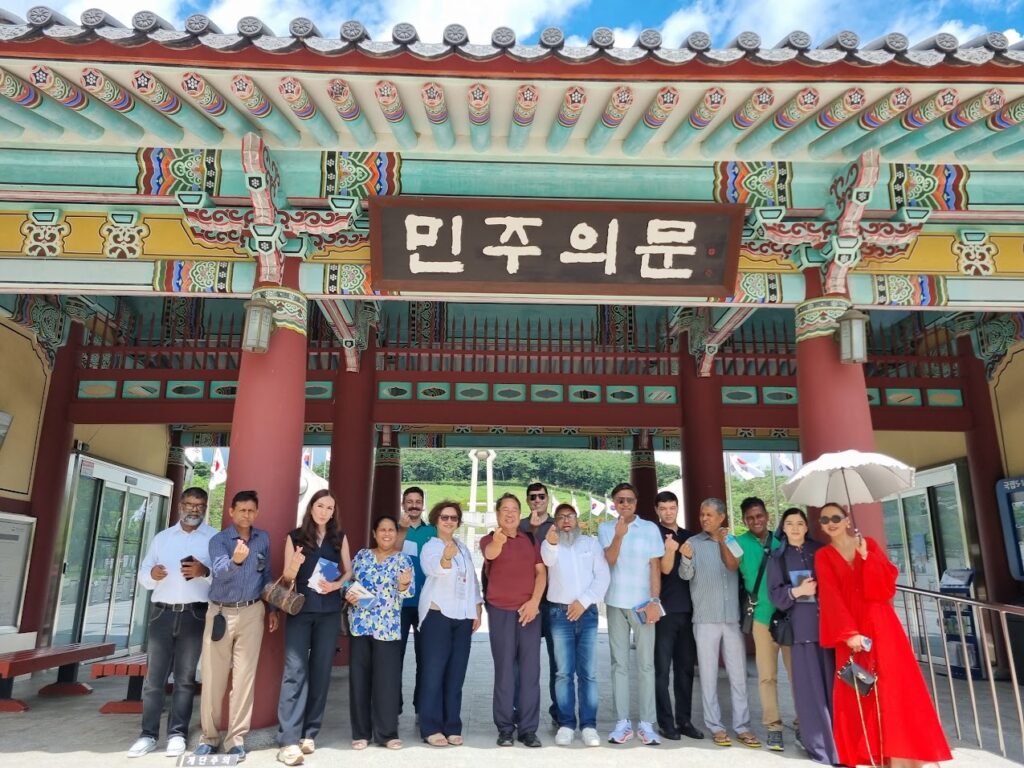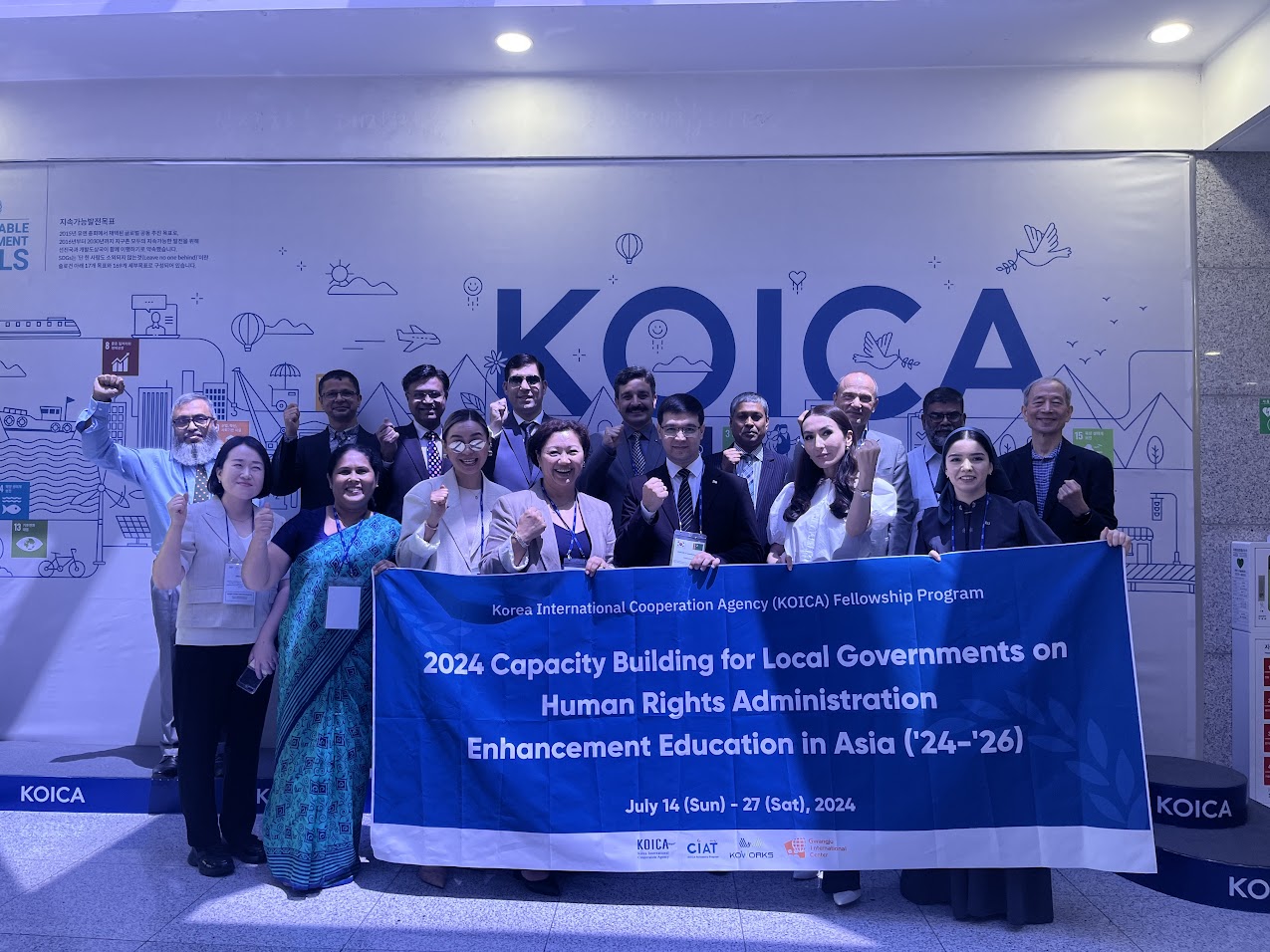GIC Hosts KOICA Fellowship Program
Human Rights Administration Enhancement in Asia
By Diariatou Gaye
The Gwangju International Center (GIC), in collaboration with the Korea International Cooperation Agency (KOICA), has launched the 2024 Capacity Building for Local Governments on Human Rights Administration Enhancement Education in Asia. This comprehensive training program, from 2024 to 2026, aims to bolster local government officials’ human rights administration capabilities across Asia. The program underscores Korea’s commitment to global human rights advocacy by addressing regional human rights challenges and promoting best practices.
A Landmark Initiative for Human Rights
The program welcomed high-level officials from Kyrgyzstan, Bangladesh, Sri Lanka, Pakistan, and Turkmenistan. From July 14 to 27, these officials participated in a series of intensive workshops, lectures, and cultural experiences designed to promote a deeper understanding of human rights and enhance administrative practices in their respective countries. The initiative represents a significant effort to build a network of informed leaders equipped to implement strong human rights policies and practices at the local government level.
Gwangju, with its historical legacy as a center of democratic movements and human rights in Korea, provided a suitable setting for this ambitious program. The city’s commitment to human rights is evident in its support for international cooperation and education. The KOICA Fellowship Program leverages this unique backdrop to inspire and educate participants, fostering a global exchange of ideas and experiences.

Building Capacity and Cultivating Change
The core of the training involved the preparation and presentation of country reports and action plans. Participants started the course by analyzing the human rights administration challenges in their own countries, culminating in detailed country reports. These reports served as a foundation for the action plans, which outlined practical strategies for addressing identified issues.
Kazi Aijaz Ahmed Mahesar, from Pakistan, highlighted the diverse challenges he and his team found across different regions of their country. They prioritized the most urgent issues and aimed to apply insights gained from Korea’s experience in addressing human rights (HR) challenges. Mahesar was particularly impressed by learning about the May 18 Democratic Movement, which coincided with a period of martial law in Pakistan. This historical context provided valuable lessons for his work on HR issues. This structured approach ensures that participants can return home with actionable plans tailored to their specific contexts, making the training immediately relevant and impactful.
La Toiia Dzhumabek, an expert in children’s rights from Kyrgyzstan, found the program exceeded her expectations with its rich content. The Kyrgyzstan team’s action plan focuses on domestic violence prevention training for children and youth, training courses for teachers and officials, and social media prevention campaigns. “If we don’t change our minds, we will not change things,” she emphasized.
Networking and Collaboration
Beyond the formal training, the program emphasizes networking and collaboration among participants. The shared experiences and diverse perspectives have created a vibrant community of practice, poised to drive human rights advancements across Asia.
Dr. Vishaka Wanasinghe, who is from Sri Lanka and works at her country’s University Grants Commission, praised the kindness and humility of the program organizers. Her team, which included members from the Human Rights Commission and the Justice Ministry of Sri Lanka, focused on educating local government servants about human rights. “Learning new concepts such as human rights and climate change and human rights in healthcare was impressive,” she said, highlighting the breadth of topics covered in the program.
Govher Berdiyeva, a diplomat from Turkmenistan’s Ministry of Foreign Affairs, emphasized the program’s role in improving bilateral relations between Turkmenistan and Korea. Having previously participated in a KOICA training program, she appreciated the opportunity to further her understanding of human rights. Dr. Shin Gyonggu’s lecture on the May 18 Movement was particularly impressive for her, underscoring the value of historical context in contemporary human rights education.
Looking Ahead
As the first year of the program concludes, participants are preparing to implement their action plans and continue their work in human rights administration with renewed vigor and enhanced expertise. The follow-up phases in 2025 and 2026 will build on these foundations, ensuring sustained progress and the realization of a robust human rights culture within their local governments.
Kazi Arifuzzaman, who is from Bangladesh and works in the Ministry of Law, highlighted the program’s impact on his legislative work. His team’s action plan focused on framing anti-discrimination laws and helping the parliament in that aspect. Inspired by the resilience of Gwangju’s citizens post-May 1980, he believes such programs are crucial for city authorities worldwide. “It’s amazing to see the achievements Gwangju has made,” he said, advocating for broader participation of local leaders in such initiatives.
The program’s multi-year structure allows for ongoing support and evaluation, ensuring that participants can refine and adapt their strategies as needed. This sustained engagement is crucial for achieving long-term impact, as it provides participants with the time and resources necessary to effect meaningful change.
A Commitment to Human Rights
The Gwangju International Center is dedicated to fostering human rights, while KOICA focuses on promoting socio-economic development through official development assistance by sharing Korea’s successful experiences with other countries. This program empowers local government officials to affect positive change and uphold community human rights. Through education, collaboration, and sustained support, the Gwangju International Center and KOICA are helping to build a brighter, more equitable future for all.
The Author
Diariatou Gaye is from Dakar, Senegal. She currently lives in Gwangju and is pursuing a master’s degree at Chonnam National University. She loves traveling, meeting new people, and is a big fan of matcha latte. She is always up for discovering new interests and diving into exciting adventures!




